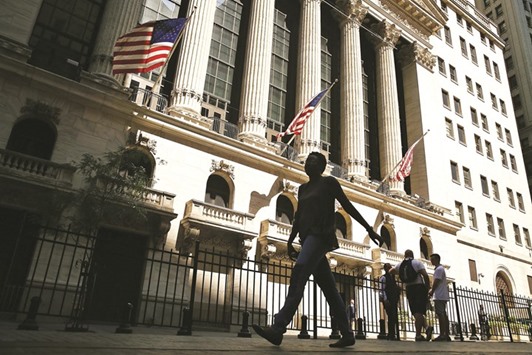October’s reputation for stock market pain looks safe.
Stung by subpar earnings then whacked on Friday by news that Hillary Clinton’s e-mails remain a topic of interest to federal investigators, the S&P 500 Index capped its third weekly loss in the past four, pushing investors towards the biggest monthly loss since January. Real estate stocks plunged 3.4% over the five days, a victim of surging bond yields in fixed-income markets suffering their worst month since 2013.
With the vote less than two weeks away, Friday offered a reminder that politics are among the biggest threats to peace in a stock market that has been holding its breath for three months as election day approached.
The S&P 500 tumbled 20 points in about 40 minutes on news the FBI reopened its investigation into Clinton’s use of an unauthorised e-mail server. That extended the gauge’s drop in the week to 0.7%, while the Dow Jones Industrial Average added 15 points to 18,161.19 over the five days.
“The market has to re-price for a new level of uncertainty, and we’re now dealing with a big heaping teaspoon of it,” said Michael Antonelli, an institutional equity sales trader and managing director at Robert W Baird & Co in Milwaukee. “If we didn’t know which way the market was leaning in terms of who it wants to win the election, we do now.”
It was hardly the first time US stocks have shown themselves to be concerned about Clinton’s political prospects. Futures on the S&P 500 rallied 0.7% during the first presidential debate as her odds of winning shot up on online prediction markets.
A victory by Donald Trump could cut the value of the S&P 500 by as much as 15%, economics professors Justin Wolfers and Eric Zitzewitz said in a paper released by Brookings Institute.
October has historically been one of the worst periods for US equity returns. The S&P 500 has risen just 0.5% on average since 1927, the fourth worst for any month. Its image has been in rehabilitation for the last couple years, though. Stocks surged 8.3% a year ago as concerns about China’s economy eased, and have gained every October since 2013.
Friday’s drama shifted sentiment away from a week of disappointing earnings in the technology industry that has erased more than $100bn from Nasdaq 100 Index stocks since Tuesday.
Megacap results have been bad enough that the 10 biggest companies in the technology index have declined an average 2.5% since October 11, trailing a 0.3% increase for the index.
Amazon.com tumbled 5.2% for its worst week since February after reporting a jump in expenses that cut into profit margins. Apple, the world’s most valuable company, fell 2.5% for its biggest slump in six weeks after issuing a sales forecast below analyst estimates. Alphabet lost 0.6% in the week.
Weakness in technology shares is especially bad news for hedge funds, which just pushed holdings of Nasdaq mini futures to a record, according to the Commodity Futures Trading Commission. Large speculators have long favoured megacap tech shares for their price momentum, riding them to results that beat the market by an average 10 percentage points in each of the last four years, according to Goldman Sachs Group.
The trade blew up in the first half of 2016, contributing to the worst start to a year on record. Since a June low, though, tech shares have carried US stocks to fresh records.
Even as US Corps are on track to snap a five- quarter profit recession, high profile misses and tepid outlooks have resulted in a picture that’s mixed, said Leo Grohowski, who helps manage more than $197bn in client assets as chief investment officer of BNY Mellon Wealth Management in New York.
“You’re not going to see this earnings season act as a big catalyst for the market because they’re simply coming in as less bad. Less bad in a fairly valued market is never going to be a huge catalyst,” Grohowski said. “On a trailing P/E basis, you can’t be expecting this market to continue to move higher with peak expansion, we need that ‘e’ part of the equation to start kicking in.”

People walk by the New York Stock Exchange. The S&P 500 Index capped its third weekly loss in the past four, pushing investors towards the biggest monthly loss since January.
